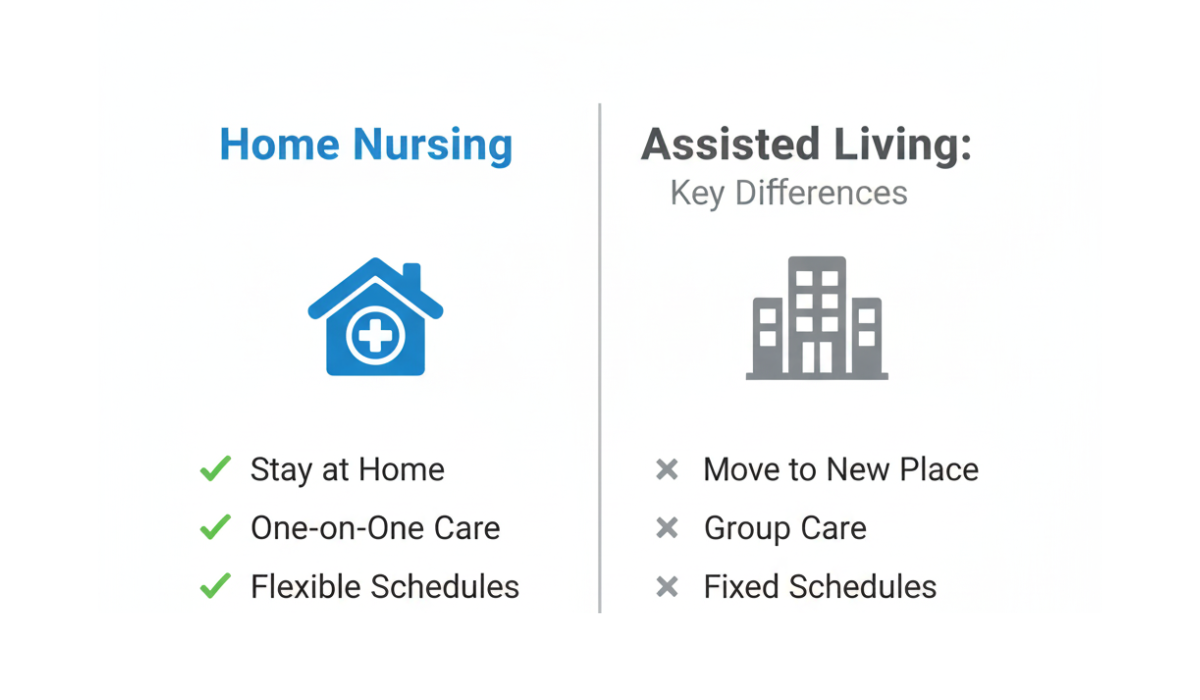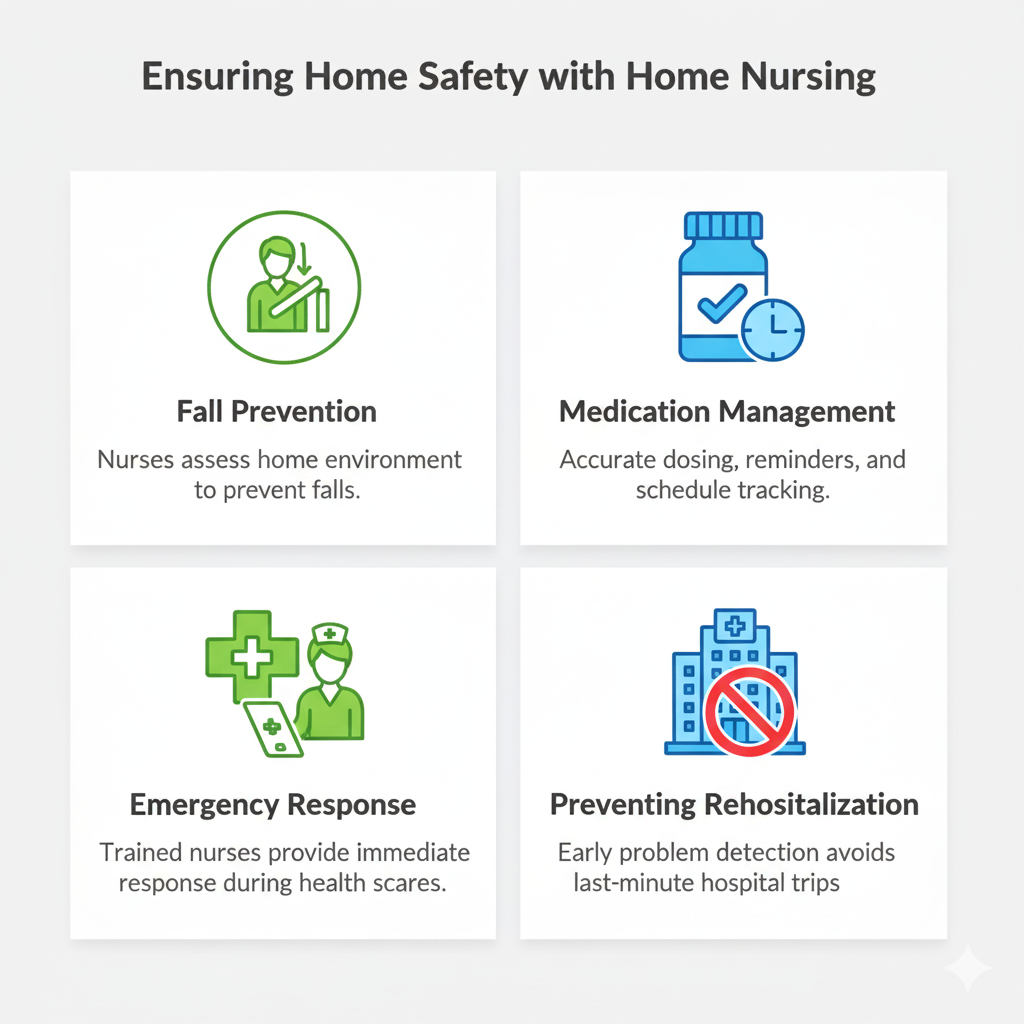Many families want healthcare that feels comfortable and personal. Home nursing has become a trusted option, helping people recover and stay healthy inside their own homes. People choose home nursing for relief from worries, faster healing, and caring support. At Dr. Morepen Home, skilled nurses bring medical care and a friendly face to every doorstep. This blog shares all the important reasons families and patients trust home nursing.
Why Choose Home Nursing Services for Your Loved Ones?
Meeting Complex Health Needs at Home
Some people need medicines, wound care, or help after surgery. Traveling can be hard, and hospitals might feel stressful. Nurses who come home make treatment easier. Families see fewer delays, better comfort, and less rushing around.
How Home Nursing Empowers Families
Taking care of a loved one can become overwhelming. Help from a professional nurse gives family members a chance to rest. People feel more confident when a trained nurse handles health needs. Families spend less time worrying and more time together.
Choosing Between Home Nursing and Hospital Stays
Hospital stays are tiring, crowded, and can expose people to germs. Home nursing lets patients stay close to family and familiar things. Recovery is often smoother, with less stress and better sleep. Expenses go down when visits to clinics and hospitals are not needed as often.
Key Differences: Home Nursing vs. Assisted Living
Assisted living means moving to a new place. With home nursing, people stay at home. Nurses work one-on-one with patients, all in a comfortable setting. Schedules are flexible. Plans match what each person really wants and needs

Who Can Benefit Most?
Older adults, people recovering from surgeries, and anyone facing health challenges enjoy home nursing. Chronic illnesses are easier to manage. Families seeking less hassle and more care find home nursing the best choice.
The Top Benefits of Home Nursing Services
Care in a Familiar and Comforting Environment
Homes bring warmth and confidence. Patients see their own things and loved ones every day. Familiar sights help with faster adjustment and calm nerves.

One-on-One Attention and Personalized Care Plans
Home nursing gives focused care. Nurses watch each patient closely, adjust plans as needed, and keep families up to date. Medicines, therapies, and daily activities fit the patient’s own routine.
Enhanced Safety, Reduced Infection Risk at Home
Being at home means fewer germs from outside places. Nurses use strict hygiene practices. Families feel safer knowing that outside risks are kept away.
Faster Recovery and Improved Health Outcomes
Research and experience say people heal faster at home. Patients enjoy better sleep and feel less anxious. Being near family encourages steady improvement.
Supporting Independence and Dignity
It’s hard to give up independence. Home nursing lets people do their usual routines. Patients set the pace. They feel respected and valued.
Convenience and Flexible Scheduling for Families
Families can choose times that work for them. Nurses visit early, late, or whenever help is needed. This makes life easier for everyone.
Specialized Services Provided by Home Nursing
Skilled Medical Support: Medication, Wound, Post-surgical
Professional nurses manage medicine schedules, care for wounds, and look after patients after operations. All tasks meet clinical standards—they just happen at home.
Chronic Disease Management at Home
Care for diabetes, heart problems, and breathing issues is better with home nursing. Nurses monitor health carefully, teach healthy habits, and help avoid emergencies.
Physiotherapy and Rehabilitation Services
People who had strokes or accidents often need extra help moving again. At-home physiotherapy helps patients regain strength slow and steady.
End-of-Life and Palliative Care Support
Nurses offer gentle palliative care. Families spend meaningful time together, with support for both comfort and emotions.
Cost Comparison: Home Nursing vs. Traditional Hospital Care
What Makes Home Nursing Cost-Effective?
Home nursing can cost less in the long run. Fewer hospital stays and lower transport charges add up to savings.
Breaking Down Common Home Nursing Expenses
Here’s what usually makes up the bill:
- Hourly nursing
- Medicine management
- Therapy and daily support
Families notice fewer surprise costs, since most care happens at home.

How Home Nursing Reduces Hospital Readmissions
Nurses keep a close watch. They spot problems early, avoiding last-minute trips to hospitals.
Value of Ongoing Monitoring and Preventive Care
Routine checks by nurses signal trouble before it gets big. Preventive care means good health for longer, with fewer emergencies.
How Home Nursing Enhances Quality of Life
Emotional Well-Being: Combatting Isolation and Loneliness
Being home with caring nurses helps fight loneliness. Patients enjoy friendly company and regular conversation.
The Role of Companionship in Recovery
Nurses bring laughter, chat, and support. This can lift moods and lower anxiety. People heal inside and out.
Maintaining Daily Routines and Family Connections
Home nursing keeps life normal. Patients continue hobbies, meals, and favorite activities. Family visits boost joy and keep spirits high.
Support for Family Caregivers: Respite Care and Guidance
Families receive not just help for the patient. Nurses offer advice, tips, and a shoulder to lean on. Caregivers get the break they deserve.
Ensuring Safety and Security at Home

Fall Prevention and Environmental Assessments
Nurses study the home. They suggest safety steps—like removing clutter or adding rails—to prevent falls.
Medication Management: Avoiding Errors
Home nurses keep medicines on track. They check doses, remind patients, and track schedules.
Emergency Response and Monitoring
Trained nurses know what to do during health scares. Family members feel safe knowing help is always nearby.
Preventing Rehospitalization
Problems get fixed quickly at home. Nurses act early, so trips to the hospital become rare.
How to Choose the Right Home Nursing Provider
Credentials and Experience to Look For
When looking for a home nurse, always check for proper training and certification. The nurse should have experience with the patient’s specific needs. Ask if they have handled similar cases before, like post-surgery recovery or chronic illness care. It’s best when nurses are part of a reputable agency like Dr. Morepen Home, as this often means added checks and ongoing training.
Customizing Your Home Nursing Plan
Every person’s health needs are unique. Talk to the provider about your family’s daily routine, the patient’s comfort preferences, and special medical requirements. Make a list of all tasks expected, from medical care to help with movement and meals. A good provider will adjust their plan as the patient’s needs change over time.
Questions to Ask Before You Hire
- Is the nurse fully certified and background-checked?
- Can they provide references from past clients?
- How is scheduling managed? Will you get the same nurse every time?
- What happens if the regular nurse is unavailable?
- How does the provider track progress and communicate updates?
- Is there a way for the family to give feedback or request changes?
Involving Family in Decision-Making
Families should be part of every step. Discuss care preferences, routines, and recovery goals openly. Keep communication clear between family members, the nurse, and the provider. The best results come when everyone works together with the patient’s well-being in mind.
Frequently Asked Questions (FAQ)
1 How do home nursing services support recovery?
Home nursing delivers medical care and support right at home. Patients feel safe and at ease, speeding up healing and reducing stress.
2 Can home nursing help with chronic conditions?
Yes. Nurses are trained to support patients living with ongoing health problems, monitor for changes, and help prevent emergencies.
3 What tasks can a home nurse do?
- Give medicine and shots
- Change dressings and manage wounds
- Support with basic daily needs like bathing and meals
- Help with physiotherapy exercises
- Offer guidance to caregivers
4 Are home nursing services covered by insurance?
Some insurance plans may cover home nursing, especially if a doctor recommends it. Always check with your provider to know what is included.
5 How does home nursing safeguard patient safety?
Nurses check for risks around the house, make sure medicines are taken safely, and respond right away if health problems come up. This keeps patients safer and helps avoid hospital stays.
.png)


.png)
.png)
.png)
.png)
.png)
.png)
.png)
.png)
.png)
.png)
.png)
.png)
.png)
.png)
.png)
.png)
.png)
.png)
.png)
.png)
.png)


.png)
.png)
.png)
.png)
.png)
.png)
.png)

.png)
.png)
.png)

.png)
.png)
.png)
.png)
.png)
.png)

.png)
.png)

.png)
.png)
.png)

.png)

.png)


.png)







